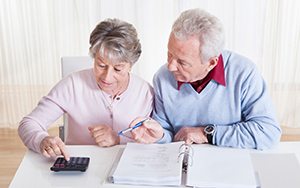Calculating retirement income is tough enough as the government keeps changing the rules about pension payments.
But even if someone approaching retirement has figured out how much money they need to fund their later years, they often forget the impact of tax and end up getting past on less money than they thought they would have.
Industry experts say most over 55s approaching retirement tend to work out their gross rather than net pension incomes – and sometimes get a shock when they realise just how much they have left out of their projected income each month.
The Prudential has crunched the numbers and reckons the average pensioner pays 30% of their retirement income in tax – which adds up to around £6,400 a year for each retired household.
Where the money goes
The money goes in income tax, VAT on goods and services and council tax, according to the study.
Losing nearly a third of expected pension income can make a big dent in a pensioner’s spending power.
On average, reckons the Pru, most households pick up around £21,300 a year gross – before tax – in retirement, and end up with £14,900 to spend after tax.
Income tax and council tax are direct taxes which pensioners have no control over – but they can pay less VAT by spending less or dealing with traders not registered for the tax.
Stan Russell, retirement income expert at Prudential, said: “Giving up work is optional, but paying tax is not. People will stay pay tax in their retirement, even if they pay no income tax, they will lose money in indirect taxes like VAT.”
Pension changes and tax
The financial firm calculated 8% of average pension income goes in income tax and VAT, 4% in council tax and 10% in excise duties for cars, wines, beers and spirits, cigarettes and fuel.
The Pru also explained that pension changes proposed by Chancellor George Osborne allowing retirees easier access to their pension funds from April 2015 will also affect the taxes they pay.
“These changes could change the amount of income tax and VAT paid. More choice could mean more tax, depending on how the money is spent or invested,” said Russell.
“Even though the way people take their pension cash is changing, they still have to plan carefully to make sure they make the most out of the cash they have and do not leave themselves short of money later in retirement.”
